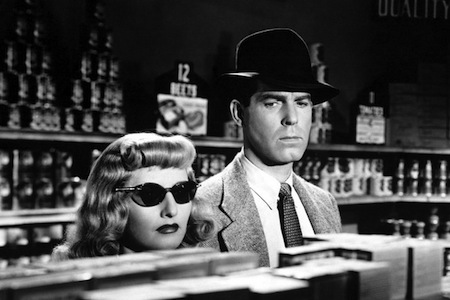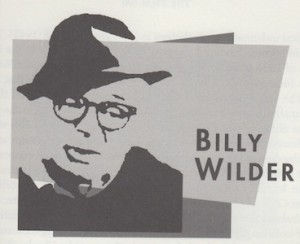Born: June 22, 1906, Sucha, Austria
Died: March 27, 2002, Beverly Hills, CA
Wilder created the sort of richly sophisticated and acerbic movies that helped give Paramount its distinction.
—Ron Base
The colorful career of Austrian director Samuel “Billy” Wilder began when he was given a job as a screenwriter on several German films in 1929. Immediately, his talent for cynicism surfaced in the intricately woven narratives he came to master. The Wilder trademark was most evident in films that had a seemingly impossible premise; one such script inspired the American film D.O.A. (1949), in which a poisoned man has just enough time left to track down his own murderer.
These ambitious scripts marked Wilder as a valuable commodity, and when he escaped Hitler’s reign in 1933 and came to Hollywood, he was courted by almost every major studio. His outsider’s view of American culture mixed well with the talents of other German immigrants, including director Ernst Lubitsch. The two men worked together on the screenplay of Ninotchka (1939). But it was a creative partnership with Charles Brackett that gave life to a sophisticated writing style on Midnight (1939) and Ball of Fire (1941). Wilder would be closely associated with Brackett over several films, which demonstrated his ability to collaborate with top talent.
In the Brackett/Wilder days, Billy assumed a more prominent role as director in some of the 1940s’ most controversial films, including the murderous film noir breakthrough Double Indemnity (1944) and a social and psychological indictment of alcoholism in The Lost Weekend (1945). The two films would become landmark cases of Hollywood resistance to the Production Code of 1934, instituted by the film industry’s puppet dictator Will Hays.
Double Indemnity was a crafty telling of an adulterous affair that leads to murder. The script called for several violations of the Code, and the film’s steamy sexual overtones drove the censors to madness. Integral to the plot was the success of the crime—the murderer had to go unpunished. This violated a strictly enforced taboo in filmmaking, but Wilder’s sophisticated script was based on a popular dime novel, and Wilder was willing to make small concessions on other plot points. The film passed the censors and went on to become a film noir classic. Incredibly daring for the times, Indemnity eluded the stifling Hays Production Code and put Wilder in the forefront of a volatile debate.
Lost Weekend showed the grim reality of alcoholism, the self-loathing, the pattern of isolation, the details of detoxification. Originally, homosexuality was behind the torment of the lead character in the novel by Charles R. Jackson. But Wilder tackled one taboo at a time. Weekend was hailed as another Wilder masterpiece, exposing the dangers of drink and breaking down the walls of silence in motion pictures. The result was a flood of films that openly dealt with alcoholism beyond the comic characterizations previously tolerated by the Hays office—Come Back, Little Sheba (1952), The Country Girl (1954) and Days of Wine and Roses (1960).
In 1946, Wilder returned from wartime duties to film the underappreciated A Foreign Affair (1948) and the nostalgic Sunset Boulevard (1950), his final collaboration with Brackett. By the time Stalag 17 (1953), Sabrina (1954) and The Seven Year Itch (1955) were reaping critical acclaim, it was obvious that Wilder was no accidental success. He was equally at ease with all subjects and genres, and his ability to combine visual beauty with intelligent dialogue made him the quintessential writer-director.
Another longtime association, with writer I.A.L. Diamond, brought out a wit in Wilder that highlighted his skill as a director of comedies and poked fun at his place in smashing taboo subjects. Cross-dressing was the focus of the classic Some Like It Hot (1959), starring Jack Lemmon, Tony Curtis and Marilyn Monroe; two other Lemmon vehicles, The Apartment (1960) and Irma la Douce (1963), tackled adultery and prostitution, respectively, and an insurance scam brought Lemmon together with Walter Matthau for the first time in The Fortune Cookie (1966). The team of Wilder and Diamond produced eleven films, tackling contemporary themes that made their work fresh well into the 1960s.
In 1986 the American Film Institute honored Wilder with a Life Achievement Award, and at the 1988 Academy Awards ceremony he was presented with the Irving G. Thalberg Award. A maverick in Hollywood, Wilder built an enviable collection of films that illuminated the dark manners and sexual mores of Americans through clever and groundbreaking scripts.
To read all the republished articles from ‘The Film 100,’ go to Reintroducing the Film 100 here on Keyframe.





